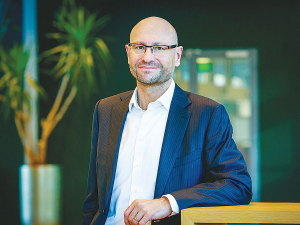The ruling paves the way for Ballance and Hiringa Energy to resume the Kapuni Green Hydrogen Project – which will remove the equivalent emissions of up to 30,000 cars per annum.
In 2019, Ballance set up the project to build four wind turbines and has consent for 5MW of electrolysis for green hydrogen production and a hydrogen refuelling station. The turbines will supply renewable electricity directly to Ballance's Kapuni site and electricity will also be used to produce hydrogen by electrolysis - splitting water into oxygen for release into the atmosphere and hydrogen to make ammonia which will then be used to make green urea at the Kapuni plant.
The zero-emission hydrogen supply will also be used to replace imported diesel used for heavy transport under a project the fertiliser co-op has underway with Hiringa Energy. Ballance currently uses diesel trucks to cart fertiliser up and down the country.
But the project stalled after Greenpeace and one local iwi appealed against the consent granted to Ballance in the High Court. However, 11 months ago, the appeal was dismissed. Greenpeace then went to the Court of Appeal and a hearing was held in May.
Ballance's chief executive Kelvin Wickham welcomed the court’s decision, saying that this project, to commence green hydrogen as a new fuel source for Taranaki and New Zealand to help tackle New Zealand’s industry and transport emissions, is a significant milestone.
“In partnership with Hiringa, the Kapuni project can now move forward with our goal of beginning to produce green hydrogen as soon as possible,” says Wickham.
“With the number of green hydrogen fleets set to climb over the next few years to help meet emission reduction targets, the clean fuel has already proven to be a key resource for the future.
“The Kapuni project will provide a lower carbon footprint for New Zealand farmers and growers, as well as supplying green hydrogen for Hiringa Energy’s heavy vehicle hydrogen refuelling network.”
Hiringa chair Cathy Clennett says that the Court of Appeal decision was a tremendous relief and looks forward to continuing to work together with local iwi, hapu, and the community to deliver the regional benefits of a low-emissions future for both electricity generation and cleaner vehicle fuel.
“Hiringa is dedicated to building green hydrogen production and infrastructure to displace fossil fuels in transport and industrial feedstock. We are a growing Taranaki-based start-up, and considerable emissions-reduction initiatives such as this put the wider spotlight on the innovation achievable in our region,” says Clennett.
“This wind generation capacity of up to 24 MW will supply renewable electricity directly to the project which will power an electrolyser to produce industrial scale green hydrogen to be used both as feedstock into the Ballance plant to reduce the plant’s environmental footprint, and as a zero-emission transport fuel.
“Further investment into the New Zealand hydrogen market is evidenced by the significant private and public sector investment in Hiringa Energy’s high-capacity refuelling network together with TR Group’s corresponding commitment to the introduction of a fleet of heavy hydrogen trucks.
“Looking ahead the growth potential is material with industry leaders like Ballance desiring decarbonisation of their assets, and now the Court of Appeal decision underscoring the original government decision to ‘fast-track’ the Kapuni project’s required consent and invest $20 million,” says Clennett.



















